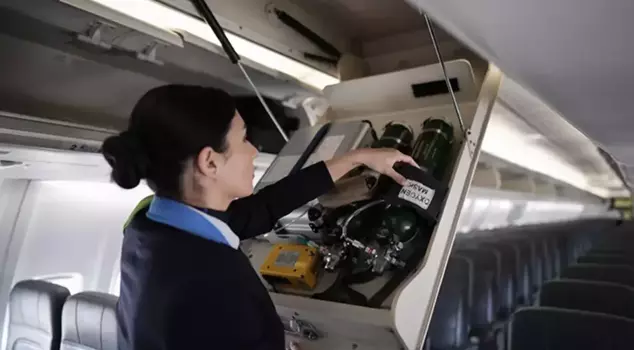
15.09.2025 23:50
British flight attendant Florence Chesson struggled to breathe and experienced nausea and vomiting due to a toxic gas that resembled the smell of "dirty socks" during a flight in 2017. After the incident, Chesson was hospitalized and diagnosed with permanent nerve damage and traumatic brain injury.
A cabin crew member's years-long health struggle in the UK has brought to light a danger in aviation that is rarely discussed. Florence Chesson, the crew member, says her life changed completely due to toxic gases she was exposed to during a transatlantic flight in 2017.
SHE SMELLED A 'STRANGE ODOR' ON THE PLANE, THEN CAME THE DISASTER
Chesson quickly realized that the strange odor she noticed early in the flight on her Puerto Rico route was not a normal situation. Initially reminiscent of a "dirty sock," this smell led to respiratory distress, nausea, and vomiting within minutes. After the plane landed, Chesson and another crew member were taken to the hospital. However, the real problem for her began after she was discharged from the hospital that day.
PERMANENT DAMAGE TO HER BRAIN
As a result of neurological tests, Chesson was diagnosed with permanent nerve system damage and traumatic brain injury. Doctors explained that the neurological impairments she experienced were similar to CTE (Chronic Traumatic Encephalopathy), a condition typically seen in athletes.
Chesson summarizes those moments with the following words: "I had a strange metallic taste in my mouth. My body was drenched in sweat, and my head was a mess. I didn't know what I was saying. I remember everything like a foggy dream."
OVER 100 PILOTS AND CABIN CREW IN THE SAME SITUATION
Chesson's doctor, Dr. Robert Kaniecki, noted that he has seen many cases with similar symptoms and that such incidents are much more common than we think. The information that 12 pilots and over 100 cabin crew members have received medical care for the same symptoms in the last 20 years also raises concerns.
THE CABIN AIR IS NOT AS INNOCENT AS THOUGHT
Unfortunately, such incidents are not rare. In 2024, a British Airways flight from Dubai had to make an emergency landing due to chemical odors spreading in the cabin. Passengers and crew experienced nausea, dizziness, and shortness of breath. Although the airline described the incident as a "minor technical malfunction," experts believe the problem is much deeper.
Experts indicate that the air from the ventilation systems in airplanes can sometimes be exposed to engine oil leaks and chemical contamination. When these gases infiltrate the cabin, they can cause serious health issues, especially for crew members who are in the air for extended periods. Chesson's experiences highlight a systemic risk faced not only by an individual but by thousands of aviation workers on a global scale.